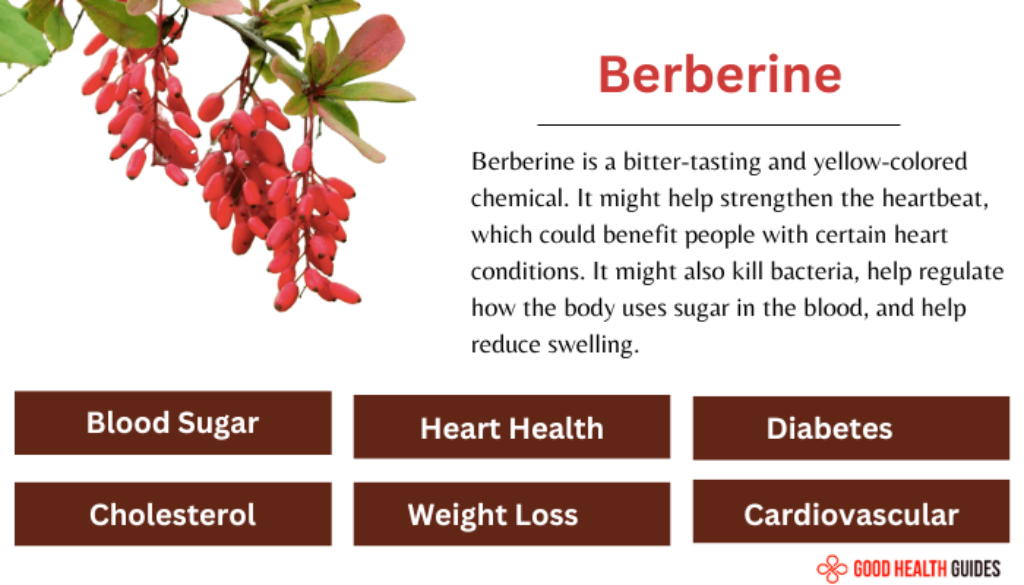Berberine: Explore Nature’s Potent Metabolic Transformer
Berberine by Good Health Guides
In the world of natural supplements and herbal remedies, few compounds have garnered as much attention and research interest as berberine.
This bioactive compound, derived from various plants, has been the subject of numerous studies exploring its potential health benefits and therapeutic applications.
From regulating blood sugar levels to exhibiting anti-inflammatory and antimicrobial properties, berberine has emerged as a promising natural compound with a wide range of potential uses.
What Is Berberine?
Berberine is a bioactive plant compound that has been used for centuries in traditional medicine systems like Traditional Chinese Medicine and Ayurveda.
It is a yellow-colored alkaloid found in the roots, rhizomes, and stem bark of several plants, including European barberry, goldenseal, goldthread, Oregon grape, phellodendron, and tree turmeric.
Berberine has a long history of use as a bitter-tasting natural dye and in treating various ailments like infections, digestive issues, and inflammatory disorders. In recent decades, berberine has gained significant interest in the scientific community due to its potential therapeutic benefits.
Chemically, berberine belongs to a class of compounds known as isoquinoline alkaloids. It is a highly bioactive molecule capable of interacting with different pathways and mechanisms within the body’s cells. This unique ability contributes to berberine’s diverse range of potential effects.
While berberine has been studied for various applications, some of the most promising areas of research include its potential to support healthy blood sugar levels, improve lipid profiles (cholesterol and triglycerides), and exhibit anti-inflammatory properties.
These effects make berberine an intriguing natural compound for addressing metabolic health conditions like diabetes, obesity, and cardiovascular disease risk factors.

Overall, berberine is a versatile plant-derived compound with a rich history in traditional medicine and an increasingly recognized potential for modern therapeutic applications, particularly in the realm of metabolic health. Ongoing research continues to explore the full scope of berberine’s benefits and mechanisms of action.
Health Benefits of Berberine
Berberine has been extensively studied for its potential health benefits, and the scientific literature has highlighted several areas where this compound may offer significant advantages:
- Blood Sugar Regulation: One of the most well-known applications of berberine is its ability to regulate blood sugar levels. Several studies have demonstrated that berberine can improve insulin sensitivity and glucose metabolism, making it a potential aid in the management of type 2 diabetes and metabolic disorders.
- Anti-inflammatory Effects: Berberine has been shown to possess potent anti-inflammatory properties, which may be beneficial in reducing the risk of chronic inflammatory conditions such as arthritis, cardiovascular disease, and certain types of cancer.
- Antimicrobial Activity: Berberine exhibits antimicrobial activity against a wide range of microorganisms, including bacteria, viruses, and fungi. This property has led to its exploration as a potential natural alternative to conventional antibiotics.
- Lipid-lowering Effects: Berberine has been found to have lipid-lowering effects, which may contribute to reducing the risk of cardiovascular disease by improving cholesterol and triglyceride levels.
- Neuroprotective Potential: Emerging research suggests that berberine may have neuroprotective properties, potentially offering benefits in the prevention and management of neurodegenerative disorders such as Alzheimer’s and Parkinson’s diseases.
Side Effects of Berberine
While berberine is generally considered safe when taken at recommended doses, it is important to be aware of potential side effects. Some commonly reported side effects include:
- Gastrointestinal Discomfort: Berberine may cause mild gastrointestinal side effects such as constipation, diarrhea, or abdominal discomfort in some individuals.
- Headaches: Some users have reported experiencing headaches or migraines while taking berberine supplements.
- Skin Reactions: In rare cases, berberine may cause skin rashes or allergic reactions in individuals with sensitivities.
- Interactions with Medications: Berberine may interact with certain medications, potentially altering their effectiveness or increasing the risk of side effects (more on this in the “Interactions” section).
Berberine and Blood Sugar Levels
One of the most well-studied applications of berberine is its potential role in regulating blood sugar levels and improving insulin sensitivity. Several mechanisms have been proposed to explain this effect:
- Increasing Insulin Sensitivity: Berberine has been shown to enhance insulin sensitivity by activating specific signaling pathways involved in glucose metabolism.
- Inhibiting Gluconeogenesis: Berberine may inhibit the process of gluconeogenesis, which is the production of glucose by the liver, thereby lowering blood sugar levels.
- Modulating Gut Microbiota: Emerging research suggests that berberine may modulate the composition and function of the gut microbiota, which can influence glucose and lipid metabolism.
- Reducing Inflammation: The anti-inflammatory properties of berberine may contribute to improved insulin sensitivity and better glucose regulation.
Can You Take Berberine with Thyroid Medication?
The interaction between berberine and thyroid medications is an area that requires further research and consideration. While some studies suggest that berberine may have a potential role in supporting thyroid function, there are concerns about potential interactions with thyroid replacement medications.
Berberine may interfere with the absorption and efficacy of synthetic thyroid hormones, such as levothyroxine (Synthroid).
It is generally recommended to consult with a healthcare professional before taking berberine supplements if you are on thyroid medication, as dosage adjustments or monitoring may be necessary.
Berberine Safety and Precautions
While berberine is generally considered safe for most individuals when taken at recommended doses, it is essential to exercise caution and consult with a healthcare professional before starting supplementation, especially in the following situations:
- Pregnancy and Breastfeeding: There is limited research on the safety of berberine during pregnancy and breastfeeding. It is advisable to avoid berberine supplements during these times unless explicitly recommended by a healthcare provider.
- Kidney or Liver Disease: Berberine is primarily metabolized by the liver and excreted through the kidneys. Individuals with kidney or liver disease may need to adjust the dosage or avoid berberine supplements altogether.
- Surgery: It is recommended to stop taking berberine supplements at least two weeks before scheduled surgery, as it may interact with anesthesia and other medications used during the procedure.
- Children: There is limited research on the safety and appropriate dosage of berberine for children, and it is generally not recommended for pediatric use unless under medical supervision.
How to Take Berberine Supplements
Berberine supplements are available in various forms, including capsules, tablets, and powders. When taking berberine supplements, it is essential to follow the manufacturer’s instructions and consult with a healthcare professional for proper dosage and usage guidelines.
Here are some general tips for taking berberine supplements:
- Timing: Berberine is best absorbed when taken with meals or shortly after eating.
- Dosage Forms: Capsules or tablets are the most common forms of berberine supplements, but some individuals may prefer to take it in powder form mixed with water or other liquids.
- Gradual Increase: It is often recommended to start with a lower dose of berberine and gradually increase it over time to assess individual tolerance and minimize potential side effects.
- Consistency: Berberine supplements may be more effective when taken consistently over an extended period rather than sporadically.
Berberine: Dosage and Recommendations
The appropriate dosage of berberine can vary depending on the individual’s age, health status, and the specific condition being addressed. Generally, the following dosage ranges are commonly recommended:
- For Blood Sugar Regulation: Typical doses range from 500 mg to 1,500 mg per day, divided into two or three separate doses.
- For Cholesterol and Lipid Management: Doses of 500 mg to 1,000 mg per day have been studied.
- For General Health and Well-being: A maintenance dose of 200 mg to 500 mg per day may be recommended.
It is crucial to consult with a healthcare professional, particularly if you have any underlying medical conditions or are taking other medications, to determine the appropriate dosage and duration of supplementation.
Berberine Interactions
Like many supplements and natural compounds, berberine may interact with certain medications, potentially altering their effectiveness or increasing the risk of side effects. Some potential interactions to be aware of include:
- Diabetes Medications: Berberine may enhance the effects of diabetes medications, such as metformin, leading to an increased risk of hypoglycemia (low blood sugar). Dosage adjustments and close monitoring may be necessary.
- Anticoagulants (Blood Thinners): Berberine may increase the risk of bleeding when taken with anticoagulant medications like warfarin (Coumadin).
- Immunosuppressants: Berberine may interfere with the effectiveness of immunosuppressant drugs used in organ transplant recipients or individuals with autoimmune diseases.
- Cytochrome P450 Interactions: Berberine may interact with medications metabolized by the cytochrome P450 enzyme system, potentially increasing or decreasing their effectiveness.
It is essential to consult with a healthcare professional before taking berberine supplements, especially if you are taking any prescription medications or have underlying medical conditions.
Sources of Berberine
Berberine is found naturally in several plant species, including:
- Goldenseal (Hydrastis canadensis)
- Barberry (Berberis vulgaris)
- Oregon Grape (Berberis aquifolium)
- Tree Turmeric (Coscinium fenestratum)
- Phellod
- Goldenseal (Hydrastis canadensis)
- Barberry (Berberis vulgaris)
- Oregon Grape (Berberis aquifolium)
- Tree Turmeric (Coscinium fenestratum)
- Phellodendron (Phellodendron amurense)
While these plants contain varying concentrations of berberine, it is important to note that supplemental forms of berberine are often derived from more concentrated sources or synthetic production methods to ensure consistent dosing and purity.
Berberine Summary
Berberine, a bioactive compound found in various plants, has garnered significant attention for its potential health benefits and therapeutic applications.
From regulating blood sugar levels to exhibiting anti-inflammatory and antimicrobial properties, berberine has emerged as a promising natural compound with a wide range of potential uses.
However, it is crucial to approach berberine supplementation with caution and under the guidance of a healthcare professional, especially if you have underlying medical conditions or are taking other medications.
While berberine is generally considered safe when taken at recommended doses, it may interact with certain medications and can cause side effects in some individuals.
Proper dosing, timing, and monitoring are essential for maximizing the potential benefits of berberine while minimizing the risk of adverse effects.
As with any supplement or natural compound, it is important to consult with a qualified healthcare provider before incorporating berberine into your routine.
By understanding the potential benefits, side effects, and interactions of berberine, individuals can make informed decisions about whether this natural compound may be a suitable addition to their overall health and wellness regimen.

